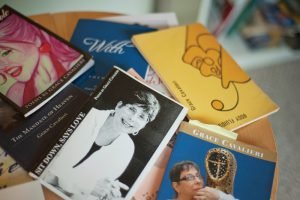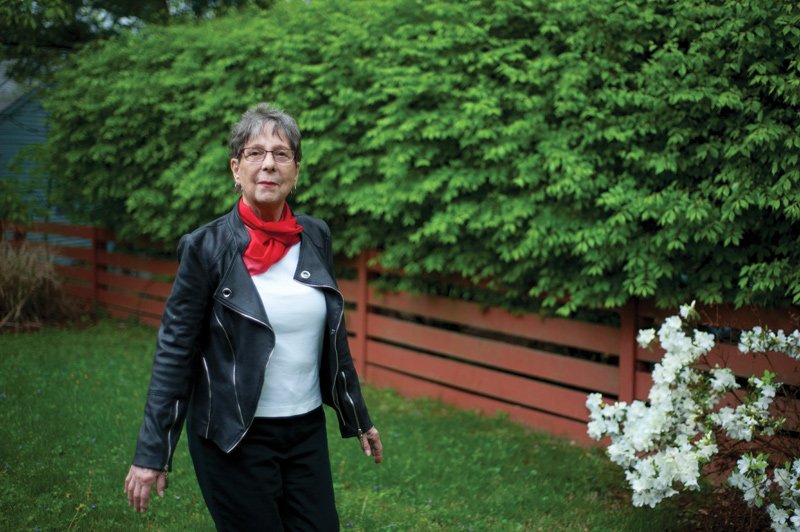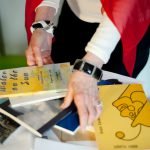+ By Andrea Stuart + Photos by Joanna Tillman
When they first walk into the classroom, their auras are muted wildflowers, colors rusted by a tired sunset that has been cast into the shadows by an early winter. The edges of their confidence wear lettuce hems that have dried in a thirsty desert, and their eyes are tattered from self-accusing thoughts that were planted into malnourished soil. Then, just a few minutes into class, their roots begin to reach the water table. Their stems and petals rehydrate with anamnesis until their hands become instruments for translating experiences previously hidden: stories come alive.
 Grace Cavalieri’s writing workshops rehydrate the soul, nourish the mind, and inspire courage. She begins each class with inspiration from her weekly Buddhist sessions, asking her students to sit silently in meditation. Many feel freedom and safety in the moment. The guided mediation turns into a visualization exercise in which students climb up the proverbial floors of their minds, stopping at levels that call to them. They write down what they see. It is sometimes a profound experience, as chapters of their personal stories begin seeping back into consciousness. “The conundrum is finding the voice,” says Cavalieri. “We all have a critic inside. Some are so large that we are convinced we shouldn’t say anything. I soften the ground.” She compares new writers to dehydrated flowers that come to life once they are watered: once their soils are moist, their writing can grow.
Grace Cavalieri’s writing workshops rehydrate the soul, nourish the mind, and inspire courage. She begins each class with inspiration from her weekly Buddhist sessions, asking her students to sit silently in meditation. Many feel freedom and safety in the moment. The guided mediation turns into a visualization exercise in which students climb up the proverbial floors of their minds, stopping at levels that call to them. They write down what they see. It is sometimes a profound experience, as chapters of their personal stories begin seeping back into consciousness. “The conundrum is finding the voice,” says Cavalieri. “We all have a critic inside. Some are so large that we are convinced we shouldn’t say anything. I soften the ground.” She compares new writers to dehydrated flowers that come to life once they are watered: once their soils are moist, their writing can grow.
If you consider Cavalieri’s repertoire, it is challenging to imagine that she could have ever been anything other than a fountain of free verse. She has written 20 books of poems, had 26 plays produced on stage—including Quilting the Sun, commissioned by the Smithsonian—produced and hosted a weekly radio show, “The Poet and the Poem,” taught countless writing and poetry workshops across the country, and is the recipient of numerous awards and accolades, including the 2013 George Garrett Award, the Pen-Fiction Award, the Allen Ginsberg Poetry Award, the DC Poet Laureate Award from Dolores Kendrick, and the Paterson Lifetime Achievement Award. Yet as any artist knows, circumstance—even crisis—is often at the heart of art.
 A former Navy wife and mother to four children, Cavalieri spent 10 years raising her family behind the quiet walls of her home. In 1960s suburban America, she was living in a man’s world, longing to be a part of the politics of the time. Eventually the pull she felt as a playwright propelled her into the phenom we know today. She’s the first to tell you that it didn’t happen overnight. “As time goes by, we figure it out,” she says.
A former Navy wife and mother to four children, Cavalieri spent 10 years raising her family behind the quiet walls of her home. In 1960s suburban America, she was living in a man’s world, longing to be a part of the politics of the time. Eventually the pull she felt as a playwright propelled her into the phenom we know today. She’s the first to tell you that it didn’t happen overnight. “As time goes by, we figure it out,” she says.
Cavalieri describes her earliest works as “genuinely impassioned,” admitting she had been silent for too long. It was a time in history when the suppression experienced by minorities, such as homosexuals, African Americans, and women, was being outed and challenged. Works were being published after being compressed for so long that they had become diamonds. Cavalieri was part of that cultural revolution. “It was genuine, back then. I did [those early works] because I had to speak,” she says.
The theme of authenticity flows like honey through the conversation as she describes the process of finding her voice. “Now, my judgment is better about what should be done on stage,” she says with a snicker. “The first 10 plays I wrote, I wouldn’t want to see again.”
When asked what she thinks she was working through when she created them, a laugh spills out of her. “You hit it on the head! In the ’60s, we were told women could not say anything in the living room that you would say in the bedroom, yet men could say whatever they wanted. I literally had to learn to type f-u-c-k,” she says, spelling out the profane word with a careful whisper in her voice. “We pushed the boundaries to be as bold as we could be, because it was a cultural revolution.”
In her memoir, Life Upon the Wicked Stage, Cavalieri discusses being confined as a Navy wife; those feelings came out in her first plays. “I was too bold. Too loud. I saw one of them recently, and I was shocked,” she exclaims. “You can swear in the living room but on the stage, it’s 10 times louder. It just wasn’t my nature, isn’t my nature.” Notwithstanding, writing those first few plays, she admits, made good theater, and it touched people on a level that had not been done previously. She found herself working alongside the best playwrights, including Joe Orton and Sam Shepherd. While living in this man’s world, earning her own version of respect, her petals began to blossom.
Cavalieri’s works, even those early pieces, are provocative and evocative. In 1972, she received a call from Catholic College Notre Dame’s Mother Superior. The school wanted to perform Best of Friends and decided to allow the character’s profanities during the performance. “It was a play criticizing Catholicism, and they didn’t even balk at that. They did it beautifully. It went all over the country. They did me a great service,” says Cavalieri, “I was having a crisis of faith at the time.”
 As for her creative inclination, Cavalieri is a poet. She likens herself to a Roman candle, given to ferocious inspired bursts. And like many artists, she has transmuted her words into various formats. Her poems occasionally take on play form, in which characters slip from stanzas onto “cast pages,” demanding that their stories be deconstructed and reinterpreted with all the textures that made up their hidden lives.
As for her creative inclination, Cavalieri is a poet. She likens herself to a Roman candle, given to ferocious inspired bursts. And like many artists, she has transmuted her words into various formats. Her poems occasionally take on play form, in which characters slip from stanzas onto “cast pages,” demanding that their stories be deconstructed and reinterpreted with all the textures that made up their hidden lives.
She first wrote Anna Nicole: Poems (2008, Casa Menendez) before turning it into the stage dramatization Anna Nicole. “I just had to put [Anna Nicole Smith] on stage. I felt she had been the most victimized.” Cavalieri explains the process of digging beneath the surface of Smith’s public life to vindicate her. Ultimately, Cavalieri’s imagining came from a deep desire to understand the aspects and consequences of hunger; hunger for fame and the way circumstance lends itself to a certain level of vulnerability that enables the type of manipulation that can paint a life in the way the media had painted Smith’s.
Another pivotal character that made her way into Cavalieri’s works is Mary Wollstonecraft. “[She] was burned in effigy,” she says of the once-controversial English writer, women’s rights advocate, and mother of author Mary Shelley. Having discovered Wollstonecraft in graduate school, Cavalieri later wrote What I Would Do for Love: Poems in the Voice of Mary Wollstonecraft and the play Hyena in Petticoats, the story of Mary Wollstonecraft. “She called to me,” she says, somberly.
She crafts subjects by channeling them until they embed themselves on the page, animated from their own ashes and refusing to sit in silence. The pen moves when Spirit tells it to, when there is space in the vessel to receive the message. For Cavalieri, she learned that she understood the world only when she saw hieroglyphics (words) on the page; that’s when she recognized the code, so writing became a natural outlet for her. “Writers are not generally visual people,” she explains. “Language helps them understand what is going on.”
 She’s come to understand that writing is often an intuitive art, yet intuition is hard to describe. The best Cavalieri can do is trust that the reader will understand. “If we believed everyone was a smart as we are, it would be easier to write. It’s an equity of spirit.”
She’s come to understand that writing is often an intuitive art, yet intuition is hard to describe. The best Cavalieri can do is trust that the reader will understand. “If we believed everyone was a smart as we are, it would be easier to write. It’s an equity of spirit.”
For Cavalieri, relationships are at the core of the human experience. If silence is a blank canvas on which to paint her ideas, then relationships are the palate from which her writings are created, and she flings chromatic syllable upon prickly verse until the brush runs dry.
Cavalieri’s gentle wisdom becomes evident when she stresses that the quality of writing is not of importance when ideas are gestating. There is a difference between the technicalities of writing versus the process itself, which is what Cavalieri teaches. The process is what allows writers to remain vital, nourished versions of themselves. Writers must first unearth their inspirations. To do that, they must rid the fear to write by understanding that all ideas, all people, have value.
During her last meeting with her Sangha, The Mindfulness Meditation Group of Annapolis, a member pulled out a crisp one-hundred-dollar bill and passed it around the group. He proceeded to nearly destroy the bill while explaining that if you tear off one third of the bill, the Federal Reserve will still accept it. Its value never changes. And so it is with each person. No matter what experiences we have in life; no matter how torn our flesh, sullied our spirits, or swollen our doubts, we always maintain our value. “Self-worth is something we’re all entitled to. Ego plays no part,” she says. “Self-questioning is part of the process.”
As Cavalieri ascends into her next project, a book called, Other Voices, Other Lives: A GC Reader, a compendium of excerpts of plays, poems, and interviews on radio (slated for an October 2017 release by Alan Squire Publishers), she is reminded of how delicate yet crude the writing process can be. “You are the sum of your ancestors and everything that ever happened in all that time,” she says. The fact is, we may never know which ones whispered themselves into our veins.
And so it is, the writer is born. Of mother. Of father. Of brother. Of sister. Of peace. Of war. Of love. Of hate. Of the hem of time.
And silence carries them. █
For more information, visit.
www.gracecavalieri.com

















